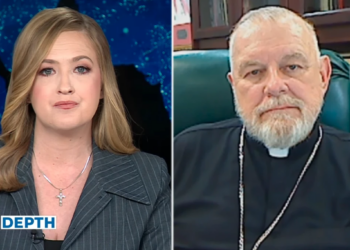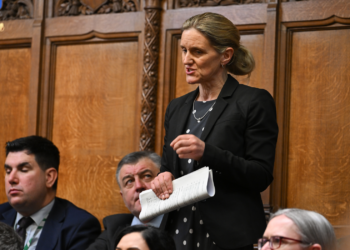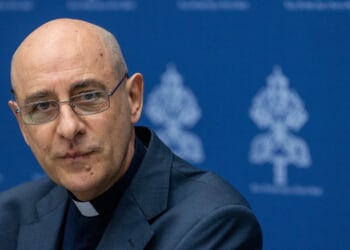CNA Staff, Jun 12, 2025 /
13:43 pm
Pro-life advocates are warning of the need to protect vulnerable patients, including the elderly and terminally ill, as New York prepares to legalize assisted suicide.
New York will become the 12th state in the country, along with the District of Columbia, to allow doctors to prescribe lethal doses of medication to terminally ill patients in order to allow them to kill themselves. The measure passed the state Legislature this week and is expected to be signed by Democratic Gov. Kathy Hochul.
New York’s law defines a “terminal illness or condition” as “an incurable and irreversible illness or condition that has been medically confirmed” and will “within reasonable medical judgment” result in death within six months.
Catholics, pro-life allies speak out against the bill
A chorus of pro-life advocates has spoken out against New York’s passage of the bill, calling on Hochul to veto it.
The New York State Catholic Conference warned that the measure would bring about an “assisted suicide nightmare,” with the bishops urging the governor this week to recognize that the law “would be catastrophic for medically underserved communities, including communities of color, as well as for people with disabilities and other vulnerable populations.”
Brooklyn Bishop Robert Brennan said the bill’s passage “while not completely unexpected, is truly disappointing.”
“We turn to the governor urging her to act boldly, consistent with her efforts to combat the suicide crisis in our state, and veto this bill,” the bishop said.
The New York Alliance Against Assisted Suicide, meanwhile, called the measure “a grave mistake for New York.”
“It brings our state dangerously close to a public policy that many in the medical, disability, and mental health communities consider deeply flawed and unjust,” the group said, adding that the law “contains no requirement that a person seeking a lethal prescription receive a mental health evaluation.”
Kathryn Jean Lopez, currently the chair of New York archbishop Cardinal Timothy Dolan’s pro-life commission, told CNA that those opposed to euthanasia and assisted suicide in the state should be prepared for a tough road ahead, saying it is virtually certain that Hochul will sign the legislation.
“She’s so enthusiastic about abortion, it would seemingly take a miracle to say no to her caucus on this,” said Lopez, who is also the religion editor at National Review.
Lopez expressed doubt that the law, if signed, will generate much sustained pushback. “There’s not going to be a march on the street to reverse assisted suicide,” she lamented.
She said that raising awareness of assisted suicide is nevertheless key, stressing the need for family and friends to defend the most vulnerable, such as the terminally ill and the elderly.
“Being advocates, that’s the most important thing at this point,” she said. “Because this is the reality we’re living in.”
Increases in suicides, reported abuses worldwide
(Story continues below)
Subscribe to our daily newsletter
Critics of euthanasia and assisted suicide have pointed to countries that have already legalized the procedure and which have seen both huge increases in suicides and reported abuses.
Eve Slater, a physician and former assistant secretary for health and human services under President George W. Bush, told CNA that in every case where euthanasia has been legalized, suicide numbers have soared.
She pointed out that suicide currently accounts for 5% of Canadian deaths, a number that rises to the double digits in some provinces. She also cited rapid rises of suicide in some European countries after the practice has been legalized.
The Canadian government in 2016 legalized “medical aid in dying.” Less than a decade later suicide accounts for roughly 1 in 20 deaths there. In some cases the suicide program has been expanded to include those who cannot consent to the procedure at the time, while hundreds of violations of the law are allegedly going unreported.
In the Netherlands last year, meanwhile, the government permitted the assisted suicide of a physically healthy 29-year-old woman with mental health issues. Other countries, such as France and England, are also actively considering allowing euthanasia.
In an op-ed last month in National Review, Slater wrote that huge increases in euthanasia are “enabled by wording that includes ambiguous eligibility criteria and then by gradual liberalization of interpretation.”
“[I]n each state where [euthanasia] has been legalized, amendments to widen eligibility either have been granted or are under discussion,” Slater wrote. “The amendments include provisions for tourism, the possibility of self-injection, a shortening of the reflection period, reduction of informed-consent safeguards, and the ability of certain nonphysicians to prescribe.”
Legal suicide ‘irrational’
Slater told CNA that New York’s willingness to embrace suicide conflicts directly with state laws requiring doctors to prevent suicide itself.
“If a patient comes in to see me, and even hints of thoughts of suicide, I am obligated — we teach this, it’s standard practice — to recommend they see a psychiatrist immediately. And if they are hesitant, we have to call security,” she said. “Now what do I do?”
Lopez also pointed out the inconsistency in how, even as assisted suicide becomes more accepted, there are still official efforts to discourage suicide in general.
“If you or I Google ‘assisted suicide’ because we’re looking for the latest news stories, we’ll get the number for a suicide hotline in response,” she said. “Someone’s still concerned you want to kill yourself and they want to talk you out of it.”
“That’s good,” she pointed out, “but it’s also irrational,” given the increasing mainstream acceptance of euthanasia.
Slater said this is “different from normal pro-life politics.”
New York residents “have to be aware of the gravity and the damage to human dignity that these laws do,” she said.
Speaking of doctors, Slater stressed that even if the doctors themselves are not explicitly pro-life, they in particular should know that the laws are “a total violation of our oath as physicians to take care of patients to the very end.”
“Doctors have to be aware that it’s effectively state-sanctioned suicide and that it sends the message that suicides under certain conditions are legitimate,” she said.


















